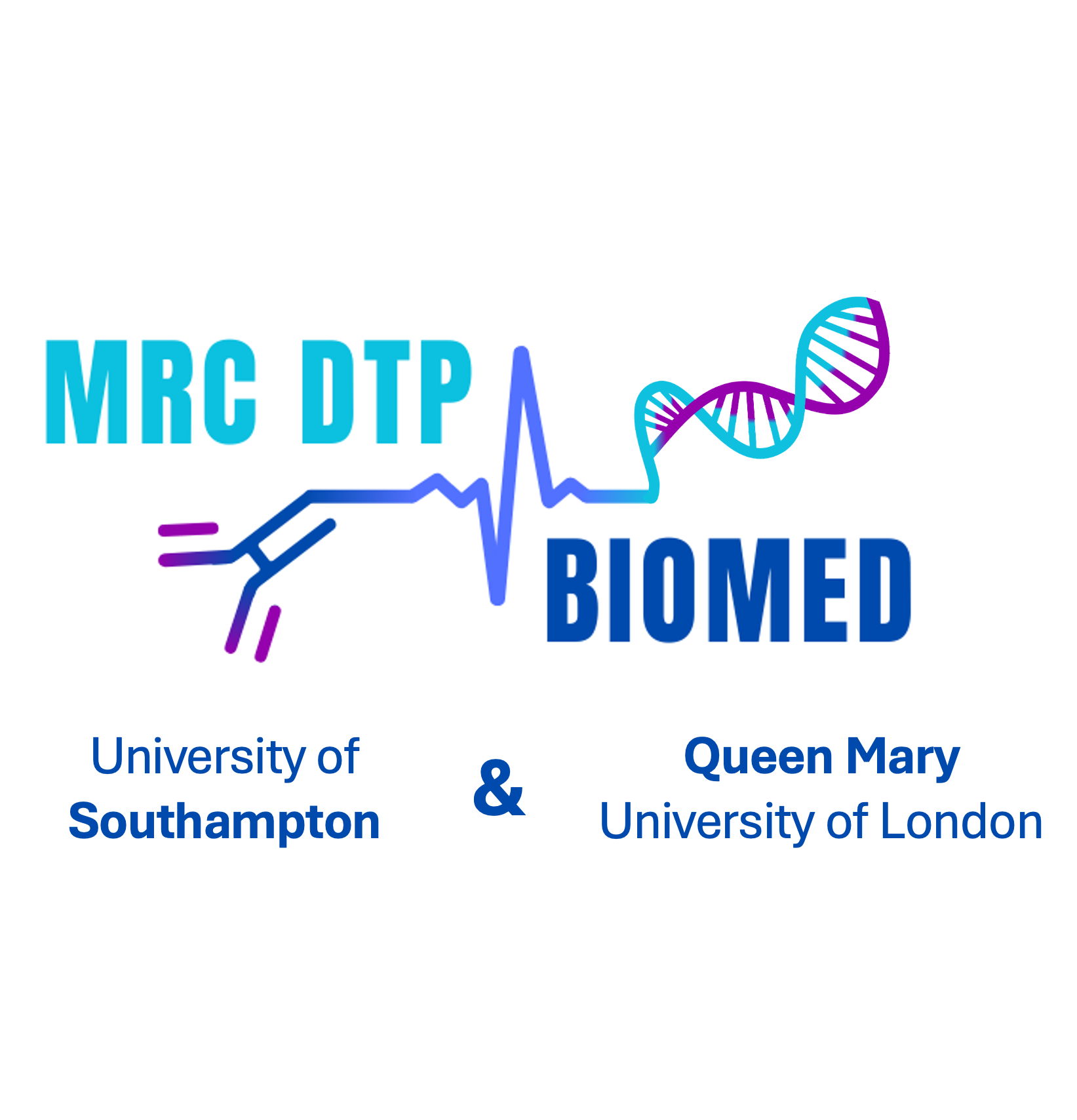
Cancer Inflammation and Immunology
About me: I received my BSc Biomedical Sciences degree from the University of Southampton where I first became interested in Cancer Immunology. This led me to complete an MRes in Cancer Biology at Imperial College London, where I worked in Ovarian Cancer Research and Glioblastoma Research labs. I then joined this MRC DTP at Barts and the London School of Medicine and Dentistry.
Have you attended, presented a poster or spoken at any conferences? I gave an oral presentation at Termis-EU 3D Bioprinting in Cancer Research (2019). I also gave an oral presentation at the International 3D Bioprinting Research Symposium (2019), where I was winner of the young investigator’s oral presentation competition. I gave a poster presentation at BioMedEng (2019).
What have you enjoyed the most and the least about your experience so far? I have mostly enjoyed learning a whole new area of research – bioinformatics. It has been very challenging, but it has been great to be able to use it in real research. It is hard to keep up with the workload as it is a very fast-paced programme, but it has been a new challenge and an enjoyable experience.
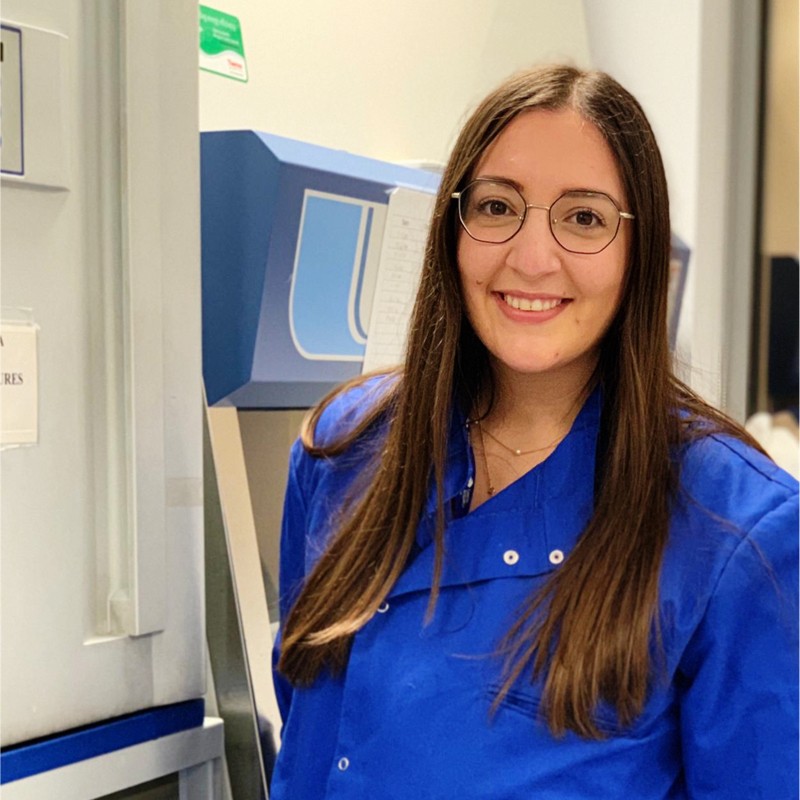
Centre for Cancer Immunology
What is your PhD project? My PhD project investigates the characterisation of LILRB3, a novel myeloid inhibitory receptor and the generation of a CAR T-cell immunotherapy against this receptor to treat acute myeloid leukaemia.
What skills have you learnt so far? Since my project involves two separate aspects, I have gained a broad range of skills to date. I have had an intense training on molecular biology as a requirement to develop the therapy. I have also gained a variety of in vitro skills ranging from transcriptional assays to co-culture of mouse and human primary cells as well as a range of cell lines. I have also gained in vivo experience including tumour mouse models where I gained various competences to be able to handle mice for experimental studies. As part of the induction statistical course I have gained knowledge and practical skills on how to apply the appropriate statistical tests to support my biological findings.
Apart from my experimental skills, I have also gained other skills such as organisational skills, time management, writing skills, presenting skills and working as part of a team and independently. I also anticipate learning how to fully generate the therapy using viral vectors as well killing assays to enable the therapeutic efficacy of the therapy to be assessed.
Have you attended, presented a poster or spoken at any conferences? Throughout my PhD studies I have attended the following conferences: British Society of Immunology Congress 2019, Liverpool, UK; Cancer Science Unit Conference, Southampton 2018 & 2019; Humanised Mouse Symposium at Cambridge University, UK 2018 & 2019; The Institute for Cancer Vaccines and Immunotherapy Conference at the Royal Society in London, UK.
I presented a poster and received first prize for my poster presentation for two consecutive years at the Cancer Science Unit Conference, Southampton 2018 & 2019. In order to attend the BSI congress 2019 in Liverpool I received a BSI bursary to cover most of the expenses.
Have you completed any additional training? I have gained additional training on structural biology by using a Small-angle X-ray scattering beamline at the European Synchrotron Radiation Facility in Grenoble, France.

Cancer Inflammation and Immunology
About me: My first degree was a BSc in Anatomical Sciences with Industrial Experience, which I completed at the University of Manchester. I went on to obtain an MSc in Cancer and Molecular and Cellular Biology at Queen Mary University of London.
What is your PhD project and how did you choose it? My PhD focuses on the role of long noncoding RNAs and the Tumour Microenvironment in High Grade Serous Ovarian Carcinoma. I considered a variety of factors when choosing my project. I compared the novelty of the research questions between each of my rotations. I also considered the resources that I would have access to, the research skills that I would learn and the ratio of computational to wet lab work involved. Furthermore, I tried to get the closest match between my learning style and my potential supervisor’s project management style.
How did you find the mathematical/computational component of the DTP? Coming from a background with minimal bioinformatics knowledge and skills, the taught bioinformatics module offered at Southampton University as part of the MRC DTP programme provided me with a solid foundation and reinforced my understanding of bioinformatics techniques, which I used in my rotations.
Do you have any publications? I contributed to Workforce Diversity: Let’s talk about race. I also have a pending publication.
Have you attended, presented a poster or spoken at any conferences? I attended and presented a poster at the 2019 EMBO/EMBL The Non-coding Genome Symposium, 16th – 19th October, in Heidelberg, Germany.
What have you enjoyed the most and the least about your experience so far? I was extremely pleased to learn that the MRC DTP programme offered PhD internships in conjunction with other organisations/industrial partners, both in the UK and abroad. My hope is that the opportunity for more internships develops to the extent that it becomes embedded in the MRC DTP programme, as an optional component, especially given that this will enable us to make informed decisions about our careers and increase our employability prospects post-MRC DTP.
Annabelle Minton (Southampton)
Cancer Sciences Pathway
What is your PhD project? My PhD project is examining the role of B-Cell receptor driven Autophagy and Phagocytosis in Chronic Lymphocytic Leukaemia (CLL). I applied for this project as my undergraduate project was examining the role of Autophagic cell death following endocannabinoid treatment, so I was already familiar with the types of pathways and assays utilised, and was interested in expanding upon this background knowledge. I already had an MRes before applying for a PhD, which was a single project rather than rotation based, and my PhD funding was for 3.5 years on an allocated project. So I went straight into this project.
What skills have you developed so far? Recovery and handling of primary CLL cells, immunoblotting, immunoflurescence, flow cytometry, phagocytosis and endocytosis assay development, development of a high-throughput autophagy assay. I have also developed my public speaking at both external and internal conferences.
I expect to more fully develop my ability to work independently toward assay optimisation and development in the final year of my PhD, since I will be starting a new chapter examining antigen presentation in CLL. This will involve collaboration with another institution, and setting up a previously untried assay for use with a reporter T-Cell clone.
Do you have any publications? BCR signaling contributes to autophagy regulation in chronic lymphocytic leukemia. Leukemia 34, 640–644 (2020). https://doi.org/10.1038/s41375-019-0557-y. This paper contains many results generated from the first year of my PhD.
Have you attended, presented a poster or spoken at any conferences? I attended the Autophagy UK 2018 conference and the UK CLL Forum 2019, where I gave a 15 minute oral presentation.
What have you enjoyed the most and the least about your experience so far? I enjoyed the support given during the first year of my PhD project by our lab group, and the CLL group in general. We have regular meetings and opportunities to present, and I think this is really something that has been well supported throughout the PhD- the opportunity to gain experience presenting at both internal meetings / conferences and external conferences.

Cancer Inflammation and Immunology
About me: I am a pharmacist by trade who was lured by the bright lights of the laboratory, the excitement of research, and by a fascination with biology. Following a long-standing desire to pursue research, I completed an MSc in Cancer and Molecular and Cellular Biology at Barts Cancer Institute during the 2016/17 academic year, which not only built my base knowledge of molecular biology, the disease of cancer, and modern immunotherapies, but it also heightened my desire to pursue research at a higher level through a PhD. Having seen first-hand the brilliance of the scientists and expertise at Barts, it was a no-brainer to apply for their 4-year MRC-funded DTP. Additionally, having now completed my first rotation, I am determined more than ever to dedicate myself to these studies; the atmosphere in the medical school is contagious!
How did you find the mathematical/computational component of the DTP? The Quantitative Cell Biology module at Southampton was a fantastic introduction to bioinformatics, coding, and R Studio. Previously, I had never analysed large datasets or attempted any coding, and so this was a completely new skillset for me to develop. It is evident that this is a must-have skill for the modern biologist in the era of ‘Big Data’, where datasets of ever-increasing size and complexity are becoming commonplace in the laboratory. Therefore, exposure to this expertise at Southampton throughout the beginning of the DTP has been a privilege, gifting us a necessary vital edge.
Do you have any publications? I have no publications to date; however, I have had two abstracts published in the Journal of Investigative Dermatology. These are as follows: iRhom2-mediated immune dysregulation: Impact on the skin and oesophagus, May 2019, Volume 139, Issue 5, Supplement, Page S78 (2nd Author); and Type 2 Immunity Linked to iRhom2 and Tylosis with Oesophageal Cancer, September 2019, Volume 139, Issue 9, Supplement, Page S287 (1st Author).
Have you attended, presented a poster or spoken at any conferences? In 2019, I attended the following conferences: Keystone Symposia: Skin Health and Disease: Immune, Epithelial and Microbiome Crosstalk, Hannover, Germany, April 8-11. Here, I presented both a poster and a short talk. Additionally, I received a travel grant from the ESDR to attend this conference for the value of €1000; 49th ESDR meeting, Bordeaux, France, 18-21 September. Here, I presented a poster as part of a poster walk; and William Harvey Day at Queen Mary University of London where I presented a poster.
Have you completed any additional training? I have obtained my animal licence, and I have also visited the Gilliet lab in Lausanne where I learnt how to perform the tape-stripping skin wounding protocol.
What have you enjoyed the most and the least about your experience so far? The most enjoyable aspect so far has been to delve into new exciting areas of biology and research. The least enjoyable aspect has been the flipside; that the rotations are short and you have to move on, even when progress in an interesting area is being made.
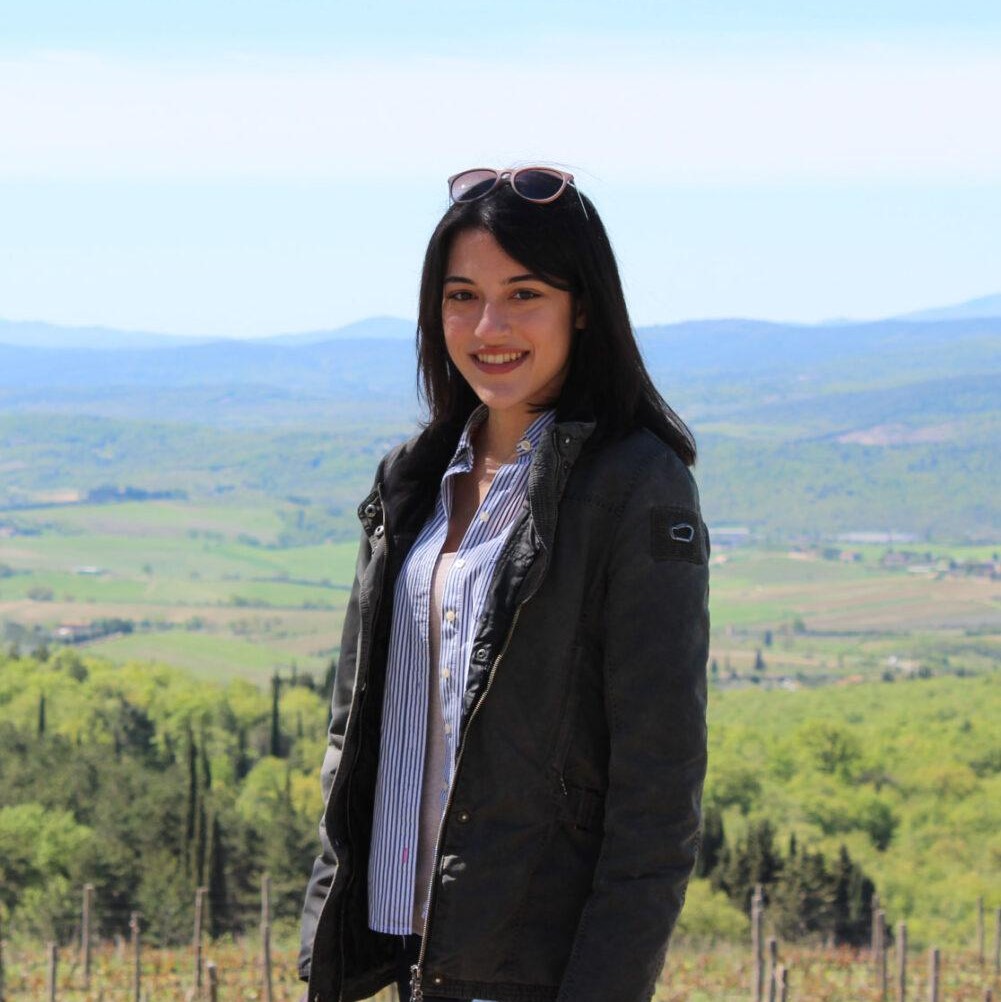
Institute of Human Development and Health
About me: I studied Biomedical Engineering at Politecnico di Milano in Italy, where I obtained my BSc degree (2015) and MSc degree (2017). I then moved to Southampton to start my PhD and now I’m in my final year and I work in a multidisciplinary team between the Faculties of Medicine and Engineering at the University of Southampton, with a collaboration with the University of Oxford.
What is your PhD project and how did you choose it? My PhD is about the development of a new treatment to enhance the bone fracture repair process. The aim of the project is to produce drug loaded microbubbles and to deliver them to a fractured bone. The drug is then released upon exposure to ultrasound in a non-invasive way. In this way, only the target site is exposed to the drug and off-site side effects are avoided. I chose this project because I’ve always been interested in bones, bone fractures and biomechanics.
What skills have you developed so far? Since I started my PhD almost three years ago, I’ve gained confidence in working in a lab and in trying to validate experimental data with computational ones and vice versa. I’ve always been an organised person, and my PhD has given me the chance to further improve my organisational skills and time management. I’ve also improved my abilities to communicate my research, pitching it to different audiences.
Have you attended any conferences or contributed to any publications? I am currently working on two papers. I have attended several internal and external conferences, including: Faculty of Medicine Conference 2018 (Southampton General Hospital, winner of ”Best Poster Prize”); Modelling and Experiments in Drug Delivery Systems (MEDDS 2018, University of Glasgow, oral presentation); Cardiff Institute for Tissue Engineering and Repair Annual Scientific Meeting (CITER 2018, Cardiff, oral presentation); VII Faculty of Engineering Conference (Southampton 2019, winner of ”Best Oral Presentation Prize”); 24th European Symposium on Ultrasound Contrast Imaging (Rotterdam 2019, poster); 19th International Symposium of ISTU (Barcelona 2019, poster); Acoustical Society of America Annual Meeting (San Diego 2019, oral presentation); 25th European Symposium on Ultrasound Contrast Imaging (Rotterdam 2020, poster).
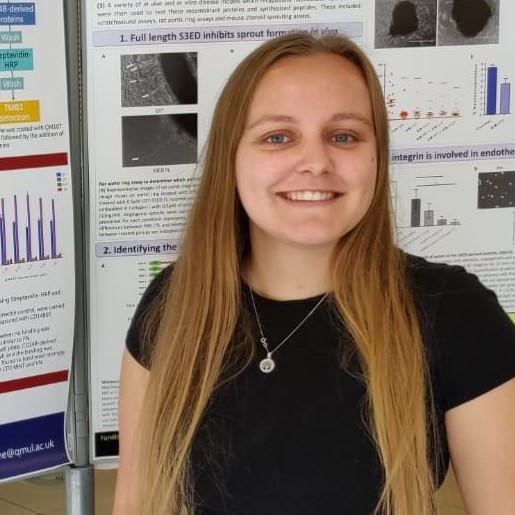
Cancer Inflammation and Immunology
What is your PhD project? I am based in Dr James Whiteford’s group in the Centre for Microvascular Research within the WHRI. My PhD project is on angiogenesis (the development of new blood vessels from pre-existing vasculature) in the context of eye diseases, such as Diabetic Retinopathy. I am currently focusing on the protein-type tyrosine phosphatase receptor CD148, to determine whether by targeting this we could halt the disease progression in eye diseases where angiogenesis is a feature.
I enjoy working in my lab, it is a supportive and sociable environment.
Do you have any publications? I was involved in, and so am named on, the review ‘Syndecan-3 in Inflammation and Angiogenesis.’
Have you attended, presented a poster or spoken at any conferences? In the last year I have attended two conferences. At the September 2019 British Society for Matrix Biology meeting “Cell Adhesion Networks in Health and Disease” I presented a poster on my latest research.
Have you completed any additional training? In November 2018 I completed the Home Office course to gain my personal license.
What have you enjoyed the most and the least about your experience so far? My favourite experience so far on the DTP has been meeting other members of my cohort in Southampton in February 2019 and learning more about them and their research. My least favourite experience was when I first started and attended the Christmas meet and greet in December 2018, as I had no idea what the programme was about nor who the other people in attendance were, so it was very disorientating. Fortunately, since attending the Southampton Away Day in February 2019, other aspects of the DTP were introduced to me through other students on the programme.
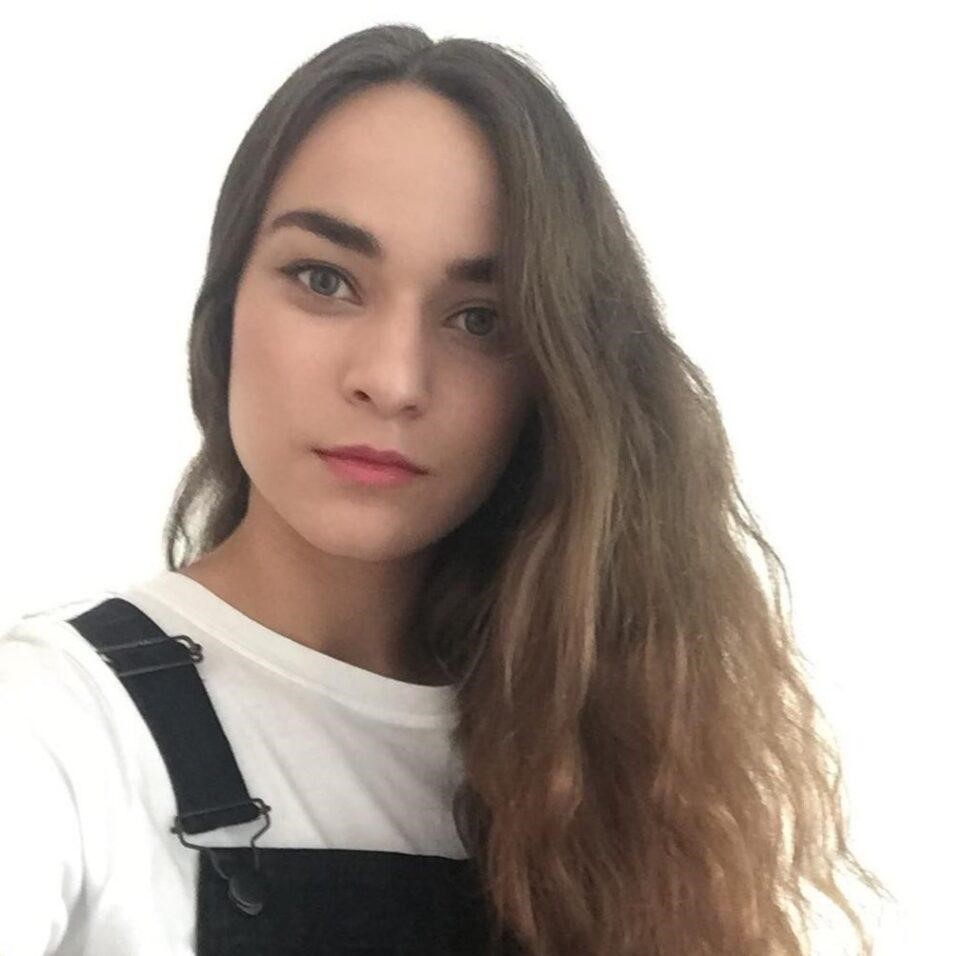
Cancer Inflammation and Immunology
What is your PhD project? My PhD project is entitled “Application of circulating tumour cell (CTC) analysis to monitor and predict prostate cancer response to Docetaxel.” So far, the project involves isolating CTCs from patient samples and performing number counts before, during and after treatment, as well as RNA/protein analysis to determine differential expression of genes involved in resistance – with the view to develop a non-invasive liquid biopsy method of monitoring and predicting treatment response in a patient specific manner. The company ANGLE plc are involved in my PhD project.
How do you think having a relationship with a company already at this stage of your PhD will help your career development? It’s a great opportunity to gain understanding of scientific research outside of academia, and to forge new professional relationships with people outside of the BCI. I will hopefully learn new, translation techniques that I can’t learn elsewhere that will aid my own research.
What have you enjoyed most about your experience so far? I have most enjoyed learning and improving my skills as a scientist, and meeting new and interesting people.
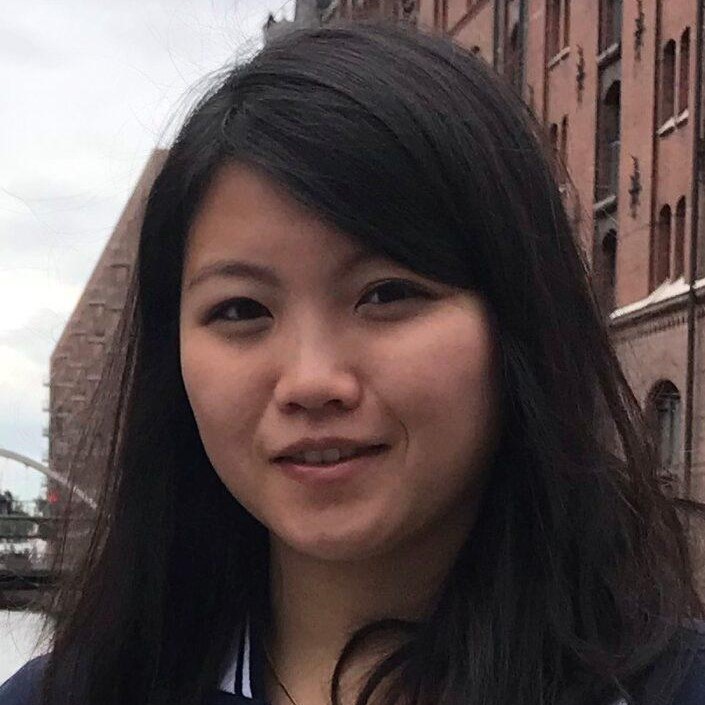
Cancer Inflammation and Immunology
What is your PhD project? I am based in Dr James Whiteford’s group in the Centre for Microvascular Research at the WHRI and my PhD project currently is in arthritis investigating the mechanisms involved fibroblast invasion and destruction into cartilage and how to target these for therapeutic treatment focusing on the relationship between syndecan-4 and PTPRsigma.
What skills have you developed so far? I have developed a range of skills so far, ranging from laboratory based techniques such as adhesion and phagocytosis assays. I hope to further develop my skills in transfections and in vivo models.
What have you enjoyed most and least about your experience so far? So far, my favourite experience has been meeting the people on the programme and hearing about their research. My least favourite experience has probably been my transfer from one lab to another.
